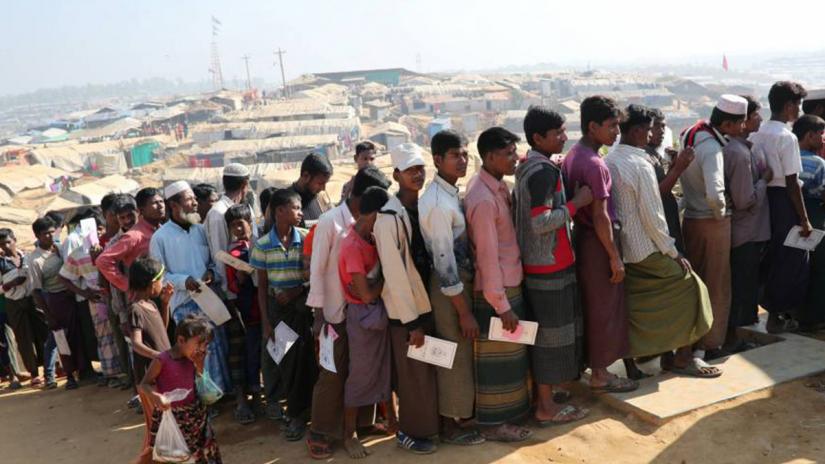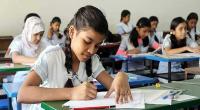 India will send winter relief materials to Cox's Bazar on Dec 24 closing the year with the fourth tranche of relief assistance to Bangladesh to deal with the Rohingya refugee crisis, reports Times of India.
India will send winter relief materials to Cox's Bazar on Dec 24 closing the year with the fourth tranche of relief assistance to Bangladesh to deal with the Rohingya refugee crisis, reports Times of India.
For the first time though, the Indian assistance will be distributed to not only the refugees but also among the local population whose lives have been severely impacted by the refugee influx. The assistance which will be given by the Indian high commission includes 2,25,000 blankets, 2,00,000 woollen sweaters and 500 solar street lights.
But while there is an official appreciation of India's gestures, Bangladesh wants India to do more of the heavy lifting on the Rohingya crisis, particularly in terms of interceding with Myanmar.
Sheikh Hasina, in interaction with visiting journalists, said, "Both India and China are supporting Myanmar. If India helped a little more, we would have been able to address this. I have asked Myanmar to create the right conditions for the refugees to return."
She said she had sent her foreign minister to look for an agreement with all neighbours - Thailand, Laos, China, India and Bangladesh - to pressure Myanmar to take back its citizens.
"We don't want to quarrel with Myanmar. But we signed an agreement. They have committed to taking them back. We are discussing with the international relief organisations to see if they can facilitate their return because the refugees here don't want to go back."
India, on the other hand, believes it has done the best it can in the circumstances. India recently built 250 homes in Myanmar's Rakhine province. Officials aver that India has kept up the pressure on Myanmar's government. In fact, India even successfully repatriated seven Rohingya who had crossed over into India and was arrested.
While the Rohingya have, by and large, been ID-ed with biometrics etc, there is trouble brewing in the camps. According to sources in Dhaka, many of the refugees who have extremist leanings or are declared members of ARSA, are refusing to give their biometric details. There are unconfirmed reports of "training" by ARSA to some of them.
Separately, the presence of such large numbers of refugees means the local population is under increasing pressure, and growing resentful, especially as the Rohingyas are willing to do the same local jobs at lower wages. Local resentment is increasing as the refugees avail international assistance - including solar mobile charging points - which is denied to the locals.
Politically, the pressure on any future government will be immense - in Germany, Angela Merkel is paying a very heavy political price for her open door policy for migrants. The Bangladesh government could be looking at a similar fallout.
In addition, extremist forces are never far away and recruiting Rohingyas would not be difficult, an eventuality that India and Bangladesh would have to confront sooner rather than later.
 Others
Others
41343 hour(s) 25 minute(s) ago ;
Morning 10:20 ; Saturday ; Jul 05, 2025
India’s fourth tranche of Rohingya aid by Dec 24
Send
Bangla Tribune Desk
Published : 18:09, Dec 23, 2018 | Updated : 19:26, Dec 23, 2018
Published : 18:09, Dec 23, 2018 | Updated : 19:26, Dec 23, 2018
0 ...0 ...
/hb/
Topics: Top Stories
- KOICA donates medical supplies to BSMMU
- 5 more flights to take back British nationals to London
- Covid19: Rajarbagh, Mohammadpur worst affected
- Momen joins UN solidarity song over COVID-19 combat
- Covid-19: OIC to hold special meeting
- WFP begins food distribution in Cox’s Bazar
- WFP begins food distribution in Cox’s Bazar
- 290 return home to Australia
- Third charter flight for US citizens to return home
- Dhaka proposes to postpone D8 Summit
Unauthorized use of news, image, information, etc published by Bangla Tribune is punishable by copyright law. Appropriate legal steps will be taken by the management against any person or body that infringes those laws.
Bangla Tribune is one of the most revered online newspapers in Bangladesh, due to its reputation of neutral coverage and incisive analysis.
F R Tower, 8/C Panthapath, Shukrabad, Dhaka-1207 | Phone: 58151324; 58151326, Fax: 58151329 | Mob: 01730794527, 01730794528

